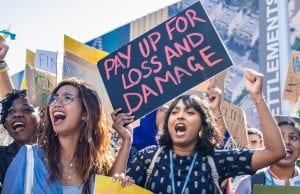by Temitope Tunbi Onifade, University of Bristol Law School
Vanuatu’s proposal for ‘an International Climate Fund to finance measures to counter the adverse consequences of climate change, and a separate International Insurance Pool to provide financial insurance against the consequences of sea level rise’ put the issue of loss and damage on the agenda during the negotiations of the United Nations Framework Convention on Climate Change (UNFCCC) in 1991. This agenda has evolved to refer to negotiations on ways to address extreme weather and slow onset events not fully dealt with by adaptation measures. Powerful jurisdictions such as the United States and European Union uniformly opposed it when it first came up and for many years after. However, this attitude has gradually changed at subsequent meetings of the highest decision-making body of the convention, called Conference of the Parties (COP). (more…)

